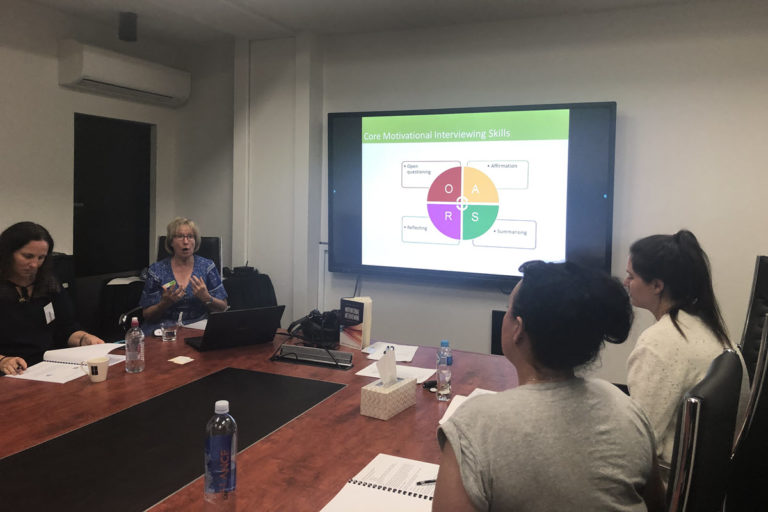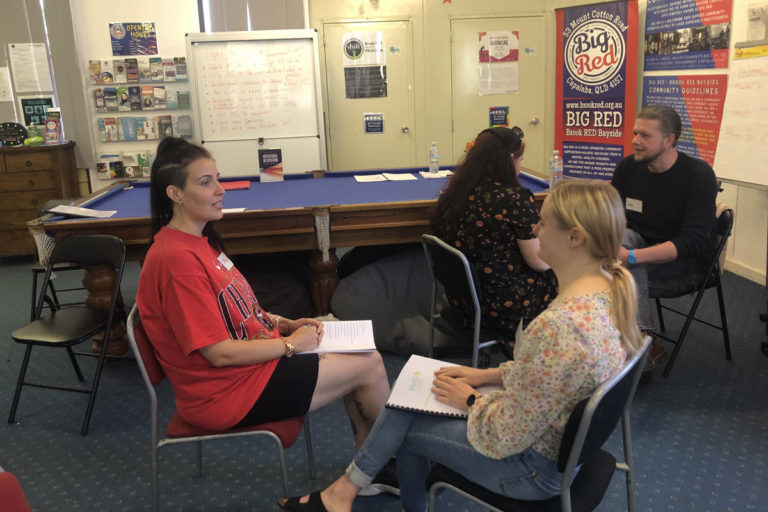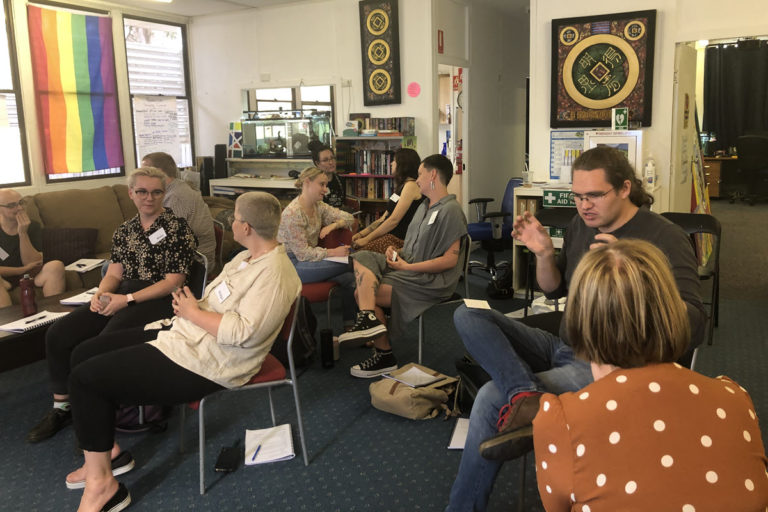The Transtheoretical Model of Behaviour Change and Motivational Interviewing
Telling a person they are at risk of disease or of developing disease complications is rarely sufficient to change their behaviour. Information about risk is just one of several influences on client behaviour. The evidence indicates that educating clients about risk has a success rate of only 5% (Britt et al, 2004). The intention in Motivational Interviewing, is to get the person to voice their reasons for change, supported by the clinician in an atmosphere of keen interest and acceptance. Maintaining behaviour change is not easy and success usually requires multiple attempts. Clinicians using Motivational Interviewing may need to have a conversation with a client in relation to behaviour change, more than once (Frost et al 2018 & Miller & Rollnick, 2013).
Decision making about change is often finely tuned and linked to other behaviours. Consider the asthmatic who uses their prescribed medication when they are unwell, but stops taking it when they feel better because they believe they no longer need it. Then they become unwell again. The challenge for the clinician is to balance their educative and collaborative roles. The clinician’s responsibility is to have a conversation with the client about their behaviour. Using Motivational Interviewing, the clinician develops a partnership with the client. Within this, the clinician’s support for, and information exchange with, the client can influence the client’s choices. Then, from this collaborative conversation, the client’s responsibility is to make a decision about what they choose to do about the behaviour. Of course, the client is still in control in relation to whether they use their medication, and this can create a challenge for clinicians.
One way for clinicians to understand a client’s struggle with change is to recognise where the client is in the change process. The Trans theoretical Model of Change, developed by Prochaska and DiClemente (1984) helps clinicians understand a client’s readiness (or not), for change.
Motivational Interviewing and the Trans theoretical Model of Change are different but complimentary and compatible (Miller & Rollnick, 2013). Let’s look at how understanding the Trans theoretical model and using a Motivational Interviewing style can help the clinician in their work with clients.
The six phases of the Trans theoretical Model of Change – Incorporating a Motivational Interviewing Style.
- Pre contemplation: In the pre contemplation phase individuals have no intention of changing behaviour and are often vocal in expressing this. For example,“ smoking relaxes me and I have no intention of stopping”. In this phase, Motivational Interviewing enables the clinician to explore ambivalence, provide information if the client wants this, and to manage conflict.
- Contemplation: in this phase individuals may still see reasons to leave things as they are, for example smoking is relaxing, or going to the gym or exercising is too time consuming. These individuals feel stuck and the disadvantages of change may outweigh the advantages. Further, contemplators may not know how to change and may lack confidence to change. Clients in the pre contemplation and contemplation phases often present as ambivalent and resistant to change. Motivational Interviewing enables the clinician to use a variety of tools to enhance confidence and self -belief, raise awareness, and assess readiness for change.
- Determination: in this phase individuals intend to change behaviour, develop action plans and attempt to overcome blocks and barriers to change. Motivational Interviewing enables the clinician to assist the individual in developing change plans.
- Action: this involves putting plans into action. Motivational Interviewing supports clients in this phase by encouraging the client to reflect on their successes, to review the gains they have made, and to problem solve any impediments they encounter.
- Maintenance: is a period where the new behaviour is sustained for a number of months or may in fact become part of a permanent lifestyle change. Maintenance is hard and individuals may still struggle with cues to old behaviours. For example, the person who hasn’t smoked for 3 months goes to a party, has a drink and has the urge to smoke a cigarette. Using Motivational Interviewing, the clinician assists the client to re frame ‘slip-ups’ or ‘trips’ not as failures, but as opportunities for better self understanding, and to review high-risk situations.
- Relapse: is common and the role of the clinician is to normalise this phase, encourage clients to learn from the experience, and to identify triggers to be avoided. Motivational Interviewing can enhance motivation by using review and reinforcement of reasons for change.
The video below reiterates the main points in this article:
The challenge for practitioners is that of being able to assess the stage of change with their client and then integrate the appropriate Motivational Interviewing strategies for that stage (De Franco & Pease 2019).
Contact us to find out more about Motivational Interviewing and how we can assist your organisation to support and empower your staff.
References
Britt, E., Hudson, S. M., & Blampied, N. M. (2004). Motivational interviewing in health settings: a review. Patient Education and Counseling, 53, 147-155.
De Franco, D., & Pease, A. (2019). Designing behaviour change support systems for behaviour transformation. CEUR Workshop Proceedings, 2340, 1-4. http://ceur-ws.org/Vol-2340/05-BCSS2019
Frost, H., Campbell, P, Maxwell, M., O’Carroll, R., Dombrowski, S., Williams, B., Cheyne, H., Coles, H. & Pollock,A. (2018). Effectiveness of Motivational Interviewing on adult behaviour change in health and social care settings: A systematic review of reviews
Published: October 18, 2018 https://doi.org/10.1371/journal.pone.0204890
Miller, W. R., & Rollnick, S. (2013). Motivational Interviewing: Helping people change (3rd ed.). New York: Guilford Press.
Rollnick, S., Butler, C., Kinnersley, P., Gregory, J., & Mash, B . (2010). Motivational Interviewing. BMJ, 340, 1242-6.
Prochaska, J.O., & DiClemente, C.C. (1984). The transtheoretical approach: crossing traditional boundaries of therapy. Homeward, Il: Dow/Jones Irwin.







